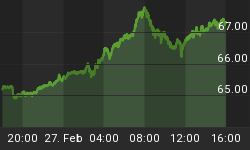The Latin American region is quite dependent upon commodities as a source of income. Boom-time has truly been good to both hard and soft commodity producers, and the smart ones, like Chile, siphoned record profits into rainy-day funds. Others, like Venezuela, squandered these funds on populist programs including massive subsidies and social agendas.
Already, we have seen prices for many of these goods collapse from the astronomical levels of last summer. Oil, copper, aluminum, corn, wheat, soybeans, etc. have all plummeted from summer prices, with gold seemingly the standalone that hasn't literally fallen off the edge due to safe-haven status.
The answer for most Latin American countries is "So what?" Boom-time was a fairly recent development for most of these commodities, so the prudent governments did not permanently price in the unrealistic gains. Truth be told, "a severe, prolonged drop" is actually just these natural resources reverting back to pre-bubble prices, and thus, not a fundamental difficulty for most of these producers to overcome.
For Argentina and Venezuela, however, and a few smaller markets, the answer has been quite painful to admit. Already Argentina has been put on watch for default and has nationalized some private assets. The price of soy (a main export) has tumbled along with most soft commodities, and the government has been attempting to raise taxes on the export to make up for collapsed prices (which led to collapsed tax receipts). In Venezuela, oil makes up over 50% of government revenues, and we all know what happened to that bubble. Chávez's daily pleading for OPEC cuts says it all.
In short, most of Latin America has shielded itself from the commodity price fall-out. The "ambitious" ones, however, might have a more difficult time adjusting to the way things are going to be.
What if there is a longer-than-expected suppression of external demand for Latin American exports?
We are beginning to see the effects of this deterioration in external demand. Export sectors are just now beginning to contract in Latin America as the developed world cuts back on consumption. This drop in demand will cause a pullback by producers in manufacturing, mining, and harvesting, leading to widespread job losses. Finally, a rising unemployment rate will hit domestic demand and pull many of these markets into recession.
The risk lies in a longer-than-expected world downturn. The discouraging part is that it's tough to see a way out for these export-dependent Latin American nations without an upturn of external demand. Fiscal and monetary stimulus will likely not lead to full recovery. Thus, it seems reasonable to say that a rebound of Latin America will coincide with an increase in consumption around the world.
What if a Latin American country were to default?
In December 2008, Ecuador's president, Rafael Correa, chose to voluntarily default on $30.6 million in interest payments on its 2012 global bonds, declaring the debt "immoral and illegitimate". The damage appears to have been contained to just Ecuador, as well it should be, and did not cause large-scale panic over Latin American debt. If anything, the collapse of Lehman Brothers in September is what pushed up emerging market bond yields the most. However, besides the obvious downgrade of Ecuador's sovereign debt, the impossibility of obtaining trade finance has become the biggest issue. The export-dependent nations of Latin America should all take heed of this tough lesson learned.
Now, were a larger default to take place (i.e. Argentina's $23 billion falling due within two years), panic would likely ensue. There is a big difference between this and a $30 million voluntary default due to ideological differences. Latin America would enter a long period of credit and FDI drought, and trade finance would be tough to come by. Borrowing costs would spike through the roof, creating a much sharper-than-expected downturn in the region. In sum, a large sovereign default would exacerbate an already-bad regional downturn and likely prolong the economic hardship.
The big question really is one of contagion, and most importantly, would Brazil get caught up in the liquidity crunch? The truthful answer is 'probably', although it is much better off to weather an extended crisis than most other Latin American nations. (Only Chile and Mexico appear to be better prepared.) However, Brazil boasts the seventh-largest stock of foreign reserves in the world at around $200 billion, which amounts to almost 11 months of import cover or close to 13 times short-term debt. In a pinch, these reserves provide excellent access to funding to protect the Real, meet debt obligations, and/or reconcile a financing deficit. Moreover, three of Brazil's four top export markets are in other regions of the world, meaning a larger Latin American default would not be a huge drag on exports, which are going to be key in reviving the Brazilian economy. The short version: we are not particularly worried about Brazil in the event of a larger Latin American default.















